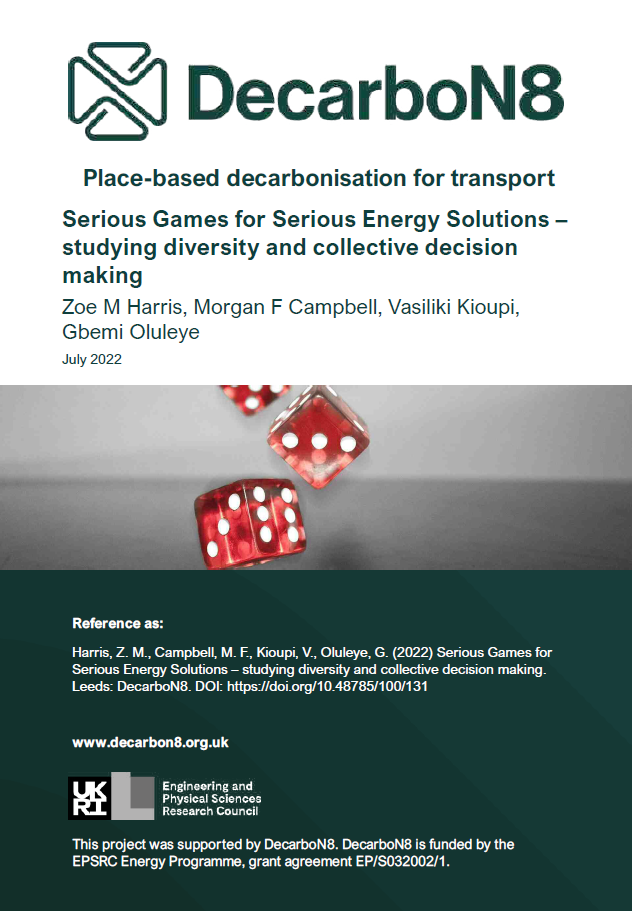Serious Games for Serious Energy Solutions – studying diversity and collective decision making
Authors: Zoe M Harris, Morgan F Campbell, Vasiliki Kioupi, Gbemi Oluleye (2022)
PDF (31 pages, 1 MB)
The aim of this project was to use a ‘serious game’ to understand and assess the impact group diversity has on collective decision-making, set within the context of sustainable development. This is the first step in developing the methodology for a larger project to understand ‘what is the baseline level of diversity required to effectively decarbonise the UK energy system?’
Project Summary
Diverse groups have been shown to result in higher levels of innovation and collaborative decision making. For the UK to meet our net zero goals in an innovative and timely manner while also representing the diverse needs and aspirations of the population requires adequate diversity within the policymaking sphere. The aim of this project is to use a serious game to understand and assess the impact group diversity has on collective decision-making, set within the context of sustainable development.
Two online workshops took place in winter 2021 using the New Shores game. New Shores is a serious game in which participants must develop an island to provide personal and community wellbeing, whilst being mindful of the impacts this development will have on the environment, which is represented as a series of climate change events, such as flood and hurricanes that occur the more the island develops. Group 1, a heterogenous (75:25 ethnic minorities: White, mixed men/women, 18-65+, lower ranking employment/unemployment) and group 2, a homogeneous group (managerial level, White men over 40 years old) were recruited. Participants remained anonymous to each other and could only communicate via a chat function. Each session was facilitated by a moderator from the research team. An EDI survey was completed before the sessions and a post-workshop survey was completed by participants. The chat scripts were analysed to assess for levels of collaboration and collective decision making and the final status of the island was analysed to assess levels of innovation.
Key Findings
Key differences were observed between the homogenous and heterogenous groups both in the state of the island at the end of the game and the levels of co-operation and decision-making observed. The final state of the island was similar between the two groups, with group one having built more resilience into their island compared to group two. The accumulated income was much higher in the homogenous group with more personal wealth unequally distributed between players. The number of natural disasters were similar on the two islands, however the homogenous group suffered more losses (houses) as a result of not protecting them. Overall, the heterogenous group worked much better together than the homogenous group. They established an open discourse and the need for collective action much earlier and as a result, they outperformed the homogenous group in terms of collective decision making, which was reflected in their island performance. The sole focus of the homogenous group was development, whereas the heterogenous group showed balance between conservation-driven and development-riven action. The homogenous group used humour and passive aggression to comment on the uneven distribution of wealth or the selfish actions of certain players. Group one was much more open in terms of pooling resources and sharing money and creating actionability as a group. In the postgame survey, participants acknowledged that they worked well together in the heterogenous group and that they acted in a self-interested manner in the homogenous group. While small scale and exploratory, our findings warrant further development of the New Shores serious game with the goal of trialling it more explicitly amongst policy and governance actors.

